Exhibition "Are the kids alright?"
// essential existence gallery
// Westwerk, Karl-Heine-Straße 93,
Tor B, 04229 Leipzig
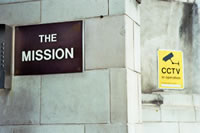
„Everyone can change -
if people who need help will not take it,
we will make them.”
(Tony Blair, Respect Action Plan, 2006)
1. What do we Want? Topics and Objectives
3.1 Description
1. What Do We Want? – Topics and Objectives
Are the kids alright? On the question of how to address “antisocial” and “deviant” behaviour in today’s youths, the British government’s answer seems to be “more control and surveillance”. One of the most popular and widespread means of UK regulatory policies is the anti-social behaviour order (ASBO) which was introduced in 1998 by New Labour under Blair. ASBOs include sanctions such as dispersal, the banning from certain urban areas, and the prohibition of certain actions or items of clothing. Political efforts to generate socially acceptable behaviour have encouraged activities of surveillance, public denunciation and shaming.
In German media, too, childhood and youth are increasingly linked to images of violent youths, armed pupils, and vandalism - caused by parental neglect and societal ignorance. Although no measures resembling the British ASBO have been taken so far, the Germans’ fear of their offspring seems to be rising.
This development initially created an unease which then stimulated the organisation of an exhibition entitled “Are the kids alright?”. The exhibition critically addresses current policies of control and the regulation of youth behaviour. The exhibition will take place between 27 March and 26 April 2009 in the essential existence gallery (eeg) in Leipzig. The project aims at creating a space which brings together scholarly and artistic perspectives, documentary commentary and aesthetic interventions.
2. The Exhibition
2.1 Artistic Positions
In order to address the complex technologies of control and regulation of youths in public spaces as diversely as possible, we have invited artists from across Europe.
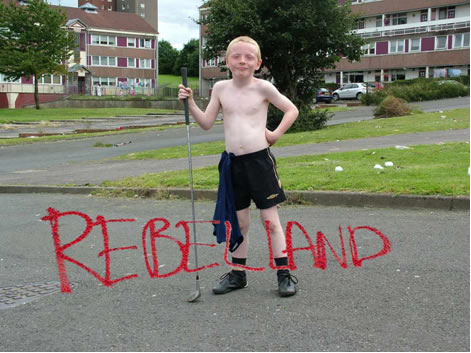
Source: Gallery of Modern Art (GoMA) / Anthony Schrag: Rebelland.
We will exhibit parts of Anthony Schrag’s project Rebelland in which the artist accompanies Scottish youths in their everyday lives with his camera. By doing so he involves the audience in a way that transcends the traditional documentary approach. His gaze transforms marginalised neighbourhoods into awkward yet lively zones of an uneven (and non-simultaneous) society. The work, which has already been displayed at the Glasgow Gallery of Modern Art, will be accompanied by a performance in the urban space which will extend the debate by raising questions relevant to Leipzig.
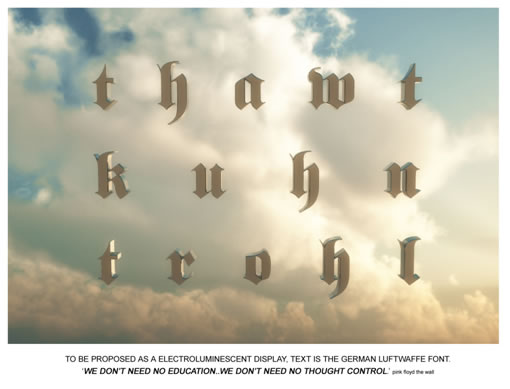
In contrast, in Michelle Hannah’s large-format pictures, formulaic catchwords in an intentionally bold typeset dominate graphic scenes in the background.
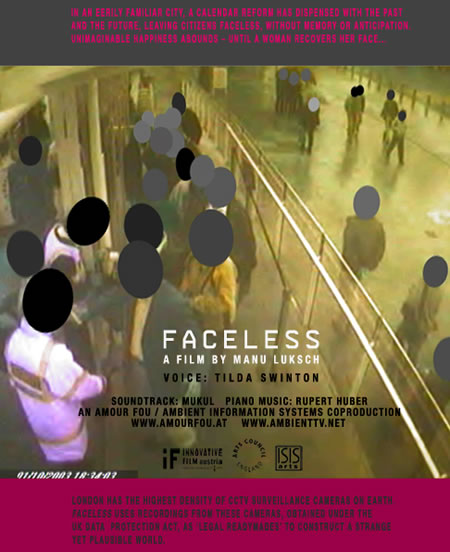
The plot of Faceless, a project carried out between 2002-2007 under the direction of Manu Luksch, is quasi-fictional but realised exclusively through the use of recordings by public CCTV cameras. The British “Data Protection Act” allows each person to claim information held about them, including CCTV images. On the basis of this legal right, the artist made use of the extensive CCTV footage of herself walking through London and assembled the film using only the state’s cameras. As required by law all other persons had to be rendered non-identifiable, hence the title Faceless. The resulting dismal aesthetics of the technical gaze contrasts with the purpose of telling an individual story.
Additional Artists:
Amanda Egbe, „Komm mit-hau ab”, Kathrin Lemcke, „the-fold”, Maayke Schurer, Boris Eldagsen, Meline Weissenborn, Moritz Frei.
2.2 The Documentary Section
The reception of the artistic positions will be framed by a documentary section. The exhibition aspires to initiate a dialogue between factual elements and artistic positions in order to raise public awareness about the topic and make its artistic reflections more accessible.
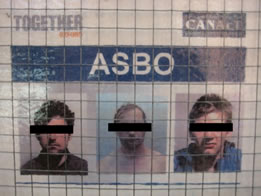 |
Denunciation of three men with ASBOs on an information board at a bus station in Oxford (Juli 2007). Photo: Jan Bachmann
NB: To make a stand against the naming and shaming campaign, we have rendered the people on the picture unidentifiable. In the original, names and the complete picture are given.
|
The documentary section provides background information on the political context and insights into the current academic debate on the new policies of regulation and control. It intends to expose current practices and show their immediate effects while confronting them with critical questions.
The exhibition aims at contributing to the debate on “democracy as a way of life” as the regulatory measures directly affect the everyday lives of (young) people. At the same, however, we are interested in the manifold ways in which young people appropriate these policies and what forms of resistance may grow out of those actions.
3. The Lecture Series
How democratically is the public space structured for young people? What is seen as socially “normal”? Do I behave in a “socially acceptable” way? Are “security” and “crime” neutral phenomena or rather products of political struggles?
The lecture series addresses these and other questions. Its starting point is the critical engagement with both current and historical developments in the UK and in Germany: How have policies of childhood and youth changed over time? What is particular about the “public space”? What similarities and what differences can we identify within the policies of surveillance and control that target “deviant behaviour” in the UK and Germany?
Taking the example of the “youth”, the lecture series explores how societies approach these questions and, by doing so, produce mechanisms of inclusion and exclusion.
We invite you to a controversial debate!
31 March 2009: Holger Ziegler (University of Bielefeld):
(at NaTo, Karl-Liebknecht-Str. 46, Leipzig 6pm, Talk given in German)
“Institutionalised intolerance: Addressing youth deviance in England and Germany”
John Muncie calls the 1998 British Crime and Disorder Act “institutionalised intolerance”. In fact, this law aims at the reduction of “antisocial behaviour” rather than crime. By analysing this law, we witness a structural shift in the regime of governing youth today which, at the same time, makes visible three ideologies at its centre: authoritarianism, communitarianism and managerialism. These elements have gained importance in German discourse as well. In the talk I inquire if we can speak about a post-welfare state logic of governing youth.
07 April 2009: Harry Hendrick (University of Southern Denmark, Odense)
(at NaTo, Karl-Liebknecht-Str. 46, Leipzig, 6pm, Talk given in English)
(Late) Modernity’s British youth and Childhood. Social Investment and the Disciplinary State. A 20th century perspective
There is widespread concern among British Non Goverment Organizations working with young people that there exists within the government and among the general public a mood of ‘zero tolerance’ towards children and adolescents that has led to their being demonised. This lecture asks why such a mood has evolved and what it signifies. The suggestion is that the demonisation of young people is a feature of particular stresses and strains associated with advanced capitalism, not only the consequences of its increasingly globalised labour market, but also those of ontological insecurity and social anxiety. Through a comparison with what is claimed to be relatively ‘optimistic’ attitudes towards young people during the ‘first’ crisis of modernity c. 1890-1914, it is argued that our contemporary malaise is marked by intolerance, suspicion, and pessimism.
14 April 2009: Bernd Belina (Johann Wolfgang Goethe University Frankfurt/M.)
(at NaTo, Karl-Liebknecht-Str. 46, Leipzig, 6pm, Talk given in German)
“What’s ‘public’ in public spaces? And what’s the link to the politics of crime reduction/prevention?”
The distinction between public and private spheres and spaces is a modern phenomenon - and a confusing one at the same time. First, the public-private distinction is explained in different ways. Second, the meanings of what is “public” and what is “private” differ considerably. The idea that the “public space” is accessible and that the “private space” is or ought to be protected has become commonsensical. Examining current developments in anti-crime policies, the presentation discusses to what extent those perceptions need to be criticised and why they are so popular.
21 April 2009: Gill Valentine (University of Leeds, UK)
(at NaTo, Karl-Liebknecht-Str. 46, 6 pm, talk given in English)
Drunk and disorderly? Strategies of Control and Resistance in the Context of Young People’s Alcohol Consumption in UK Public Space .
There is widespread concern in the UK about young people’s binge drinking in public space. This has been prompted by concern about alcohol-fuelled disorder on the streets and conflicts between young people — as a night-life active group — and older residents as late-night venues have encroached upon traditional residential areas. In this context, there has been the re-emergence of the ‘moral panic’ about young people as ‘out of control’. Many local states have sought to maintain public order by restricting the growth of drinking outlets, passing byelaws to curb drinking on the streets, increasing CCTV surveillance and community policing, and creating multi-agency teams to tackle the ‘youth problem’ in an attempt to regulate these ‘deviant’ bodies. At the same time, blame has been laid at the door of parents for adopting a more liberal approach to child-rearing in the context of individualisation, introducing children to alcohol at a young age in the family context and condoning their experiments with drink. This presentation will critically engage with these debates about intergenerational relations and strategies of control and resistance in the context of British youth.
The project “Are the kids alright?” is organized in cooperation with Weiterdenken - Heinrich Böll Stiftung Sachsen .The exhibition and the lecture series are financed with help of the European Union and the Student Council of the University Leipzig.


